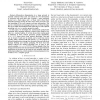2084 search results - page 272 / 417 » Proving Time Bounds for Randomized Distributed Algorithms |
110
click to vote
ICML
2004
IEEE
16 years 3 months ago
2004
IEEE
The multiple-instance learning (MIL) model has been very successful in application areas such as drug discovery and content-based imageretrieval. Recently, a generalization of thi...
116
Voted
INFOCOM
2011
IEEE
14 years 6 months ago
2011
IEEE
—Information dissemination in a large network is typically achieved when each user shares its own information or resources with each other user. Consider n users randomly located...
143
click to vote
INFOCOM
2010
IEEE
15 years 1 months ago
2010
IEEE
—With the convergence of multimedia applications and wireless communications, there is an urgent need for developing new scheduling algorithms to support real-time traffic with ...
127
Voted
SRDS
2008
IEEE
15 years 9 months ago
2008
IEEE
Distributed storage systems often use data replication to mask failures and guarantee high data availability. Node failures can be transient or permanent. While the system must ge...
112
click to vote
STOC
2005
ACM
16 years 2 months ago
2005
ACM
In the setting of secure multiparty computation, a set of parties wish to to jointly compute some function of their input (i.e., they wish to securely carry out some distributed t...

